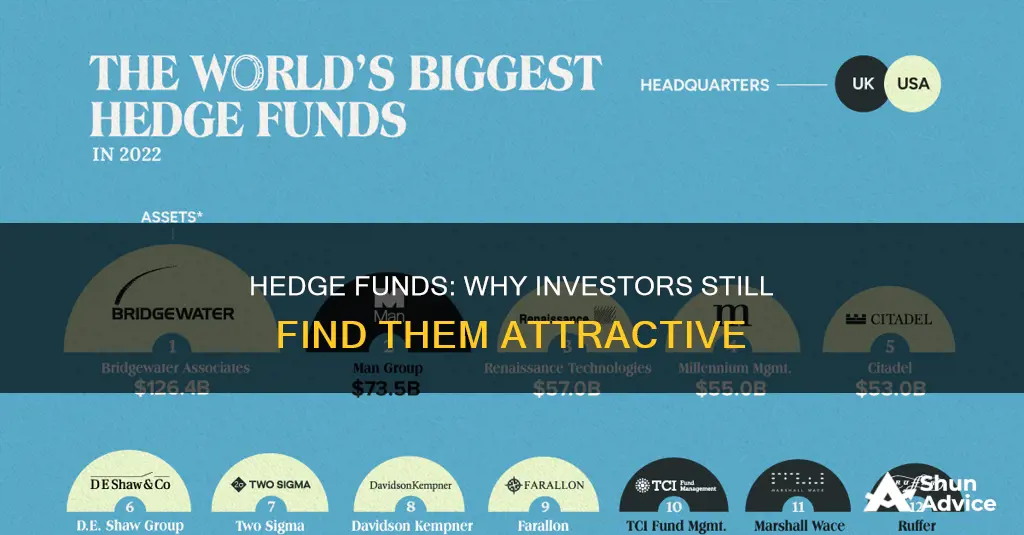
Hedge funds have historically been seen as an exclusive club for the rich, promising high returns. However, in recent years, they have underperformed the market, leading some to question their value. So why are people still investing in them?
Hedge funds are a type of financial firm that pools client money to invest in stocks and other assets, such as real estate, art, and currency. They employ a range of strategies, including short-selling and leveraging, to aggressively pursue higher profits. This makes them much riskier than other types of investments, such as mutual funds or exchange-traded funds (ETFs). Despite their risks, hedge funds appeal to investors who want to continue earning returns even during bear markets.
Another reason for their continued popularity is the perception that hedge funds offer a level of prestige and exclusivity. They are typically only accessible to institutional or accredited investors, such as pension funds or individuals with a net worth of at least $1 million. This creates an aura of exclusivity and sophistication around hedge funds, making them attractive to wealthy individuals seeking to preserve their capital.
Additionally, hedge funds provide an alternative way to make money. Some funds focus on market-neutral strategies, providing lower but more stable returns than the stock market. Others, like activist hedge funds, aim to influence and unlock value in undervalued companies.
In summary, while hedge funds have faced criticism for their high fees and underperformance, they remain attractive to investors due to their potential for high returns, exclusivity, and ability to provide alternative investment strategies.
| Characteristics | Values |
|---|---|
| Returns | Hedge funds have historically underperformed stock market indices. |
| Risk | Hedge funds are riskier than most other investments. |
| Investment strategies | Hedge funds employ aggressive investment strategies, like leveraged, debt-based investing and short-selling. |
| Assets | Hedge funds can purchase types of assets other funds can’t invest in, like real estate, art and currency. |
| Investors | Hedge funds are exclusive to institutional investors, like pension funds, or accredited investors. |
| Minimum investment | Minimum initial investment amounts for hedge funds range from $100,000 to upwards of $2 million. |
| Liquidity | Hedge funds are not as liquid as stocks or bonds. |
| Fees | Hedge funds carry hefty fees. Typically, they charge an asset management fee of 1-2% and a performance fee of 20%. |
| Regulation | Hedge funds face little regulation from the SEC compared to other investment vehicles. |
What You'll Learn

The allure of high returns
Hedge funds are financial partnerships that employ various strategies to maximise returns for their investors. They are generally more aggressive, riskier, and more exclusive than mutual funds. Hedge fund managers have the freedom to invest in a wide variety of assets and employ bolder strategies in pursuit of higher profits.
Hedge funds have a reputation for delivering outsized returns by taking on greater risk. They employ aggressive investment strategies, such as leveraged and debt-based investing, short-selling, and investing in alternative assets like real estate, art, and currency. These strategies can lead to significant gains when successful.
Additionally, hedge funds are known for their ability to generate returns regardless of market conditions. This is particularly appealing to investors who want to continue earning returns even during bear markets or downturns. The potential for high returns and the perception of exclusivity contribute to the allure of hedge funds for some investors.
However, it is important to note that hedge funds have historically underperformed stock market indices in the long term. The high fees associated with hedge funds, typically around 2% management fee and 20% performance fee, can also eat into overall returns. Despite this, the prospect of high returns remains a driving factor for many investors who choose to invest in hedge funds.
Cannabis Investment Opportunities: Vanguard Mutual Fund Options
You may want to see also

Diversification of portfolios
Hedge funds are financial partnerships that employ a variety of strategies and invest in a wide range of assets, including real estate, art, and currency. They are generally more aggressive, riskier, and more exclusive than mutual funds. Hedge fund managers have more freedom to invest in non-traditional assets and employ riskier strategies, such as leveraged, debt-based investing and short-selling, in pursuit of higher profits.
This diversification of portfolios is particularly attractive to high-net-worth individuals (HNWIs) who are looking to preserve their wealth and protect their capital in the event of a market downturn. While hedge funds may not always outperform the market in terms of returns, they can provide uncorrelated returns that help to reduce overall portfolio risk.
For example, a portfolio that includes a hedge fund with a consistent 5% annual return after fees, alongside an investment in the S&P 500, would outperform the S&P 500 over the long run if rebalanced yearly. This is because the hedge fund allows investors to buy at depressed market prices during the rebalancing process.
Additionally, some hedge funds focus on market-neutral strategies, providing lower returns than the stock market but with less market risk. This can be attractive to investors who want to make money without taking on the same level of risk as investing in the stock market.
Overall, despite the high fees, lock-in periods, and minimum investment requirements associated with hedge funds, they continue to be attractive to investors seeking to diversify their portfolios and protect their wealth.
Smart Ways to Invest Your Rainy Day Fund
You may want to see also

Preservation of capital
Hedge funds are a way for the wealthy to preserve their capital. They are a tool to diversify portfolios and protect against huge market downturns and black swan events. They are an alternative asset with low correlation to other assets.
The rich get their money through risky investments, so they use hedge funds as a way to preserve their capital. They don't seek substantial gains because if they wanted to do that, they would invest in their own companies.
Hedge funds are also a way to preserve capital during a bear market. They can turn a profit when the market is down. This is a useful tool for rich people who want to preserve their wealth and not maximise long-term returns.
Hedge funds are a way to make money without market risk and add diversification to a portfolio. They are a stable investment that performs in all conditions, including inflation and market downturns.
They are a way to preserve capital for the very wealthy. They are a safe and stable investment that performs in all market conditions.
Activewear: Which Investment Funds are Taking an Interest?
You may want to see also

Lack of regulation
Hedge funds are financial partnerships that employ various strategies to maximise returns for their investors. They are generally more aggressive, riskier, and more exclusive than mutual funds.
Hedge funds are not subject to the same regulations as mutual funds, and this lack of regulation is a key reason why people continue to invest in them.
Hedge funds face little regulation from the Securities and Exchange Commission (SEC) compared to other investment vehicles. The SEC only requires hedge funds to register if they have more than $150 million in private funds and manage one or more funds. This means that hedge funds have more freedom to invest in non-traditional assets and employ riskier strategies.
The lack of regulation also makes it harder for investors to get a handle on what a hedge fund owns or how it is performing. This can be a concern, as hedge funds have high minimum investments (typically $1 million) and lock-in periods during which investors cannot withdraw funds. They also charge relatively high fees, typically a 2% management fee and a 20% "performance fee".
Despite the high fees and lack of transparency, some investors are attracted to the potential for higher returns offered by hedge funds. Hedge funds employ a range of alternative strategies, such as short-selling stocks and taking large positions in companies, to try to trounce the market.
In summary, the lack of regulation in the hedge fund industry allows funds to pursue more flexible and risky strategies, which may result in higher returns for investors. However, this also comes with increased risk and less transparency for investors.
HOA Funds: Where to Invest for Maximum Returns
You may want to see also

Alternative investment strategies
Hedge funds are financial partnerships that employ various strategies to maximise returns for their investors. They are generally more aggressive, riskier, and more exclusive than mutual funds. Hedge fund managers have more freedom to invest in a wide variety of assets and employ bolder strategies in pursuit of higher profits.
- Global Macro: This strategy involves taking broad economic views and investing in a range of asset classes, such as stocks, bonds, currencies, and commodities, based on expectations of future economic conditions.
- Event-Driven: This strategy focuses on investing in companies undergoing significant events such as mergers, acquisitions, restructurings, or other corporate changes. The goal is to profit from the potential mispricing of securities before, during, or after these events.
- Relative Value (Arbitrage): This strategy seeks to exploit price discrepancies between similar financial instruments, such as stocks, bonds, or derivatives. Hedge funds may take long and short positions in different instruments to profit from the convergence of their prices.
- Market Neutral: This strategy aims to generate returns that are uncorrelated to the broader market direction. Hedge funds employing this strategy typically hold long and short positions in various stocks or sectors to reduce the impact of market movements on their portfolio.
- Activist Investing: Hedge funds may take large positions in companies and actively influence strategic decisions, board composition, or management changes. This strategy aims to unlock value and improve the financial performance of the companies they invest in.
- Leveraged Investing: Hedge funds can use borrowed money (leverage) to increase the potential returns on their investments. This strategy can amplify gains but also increases the risk of losses.
- Short-Selling: Hedge funds are not constrained by the same regulations as mutual funds, allowing them to short-sell stocks, which involves borrowing shares and selling them in the hope of repurchasing them at a lower price in the future.
- Alternative Asset Classes: Hedge funds can invest in a broader range of assets, including real estate, art, and private companies. This provides investors with exposure to alternative investments that may not be accessible through traditional mutual funds.
These alternative investment strategies offer hedge funds the potential for higher returns and the ability to profit in both bullish and bearish markets. However, it is important to note that these strategies also come with higher risks and may not always outperform the broader market indices.
Funding Sources for Private Investment: Where Does Money Come From?
You may want to see also
Frequently asked questions
Hedge funds charge fees that are relatively high compared to mutual funds, with a 2% management fee and a 20% "performance fee" being standard. These fees can eat into overall returns. However, hedge funds are seen as an exclusive club that offers the chance of higher returns.
Hedge funds have high minimum investments, with $100,000 to upwards of $2 million being common. This is because they are generally only open to institutional investors or accredited investors with high net worths and incomes.
Hedge funds are riskier than most other investments and employ aggressive investment strategies. They take on these riskier strategies to produce returns regardless of market conditions, which appeals to investors looking to earn returns even in bear markets.
Hedge funds have historically underperformed stock market indices like the S&P 500. However, they are designed to provide growth despite market conditions and can turn a profit when the market is down.







